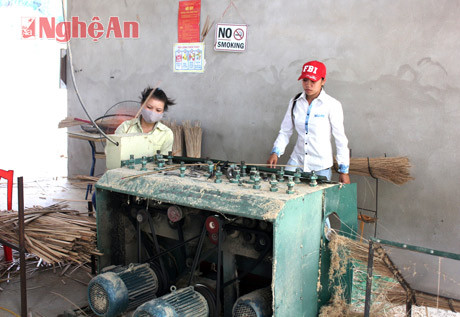Protecting bamboo and reed raw material areas in Que Phong
(Baonghean) - Recently, in Que Phong district, there has been a situation of competition for raw materials between businesses, causing insecurity and affecting the sustainable development of forests. This issue needs to be thoroughly resolved by the authorities and organizations at all levels in the near future.
Recently, the exploitation of bamboo and reed in Que Phong district has become complicated when many businesses have not been granted licenses but still blatantly entered the forest to exploit. Recently, some traders from outside the locality have come to exploit bamboo and reed, collect goods and transport them out of the locality. In response to the above situation, the Department of Agriculture and Rural Development has issued many directives such as Document 2350/NN-LN dated November 12, 2012 and Document No. 401/NN-LN dated March 6, 2013 to rectify the above situation. Along with that, the People's Committee of Que Phong district also issued Document 15/UBND - NN dated January 7, 2013 and Document 42/UBND - NN dated January 15, 2013 on checking means of transporting forest products (wood and reed) illegally, without accompanying documents, confiscating and temporarily detaining.
Faced with the above situation, the People's Committee of Dong Van commune established a raid committee headed by the commune vice chairman, coordinating with the company to confiscate the tools of outsiders who exploited bamboo in the area. Most recently, on August 23, 2013, two cars with license plates 37C-03817 and 37C-07271 transported bamboo out of the locality. According to the drivers, the quantity of bamboo on the two vehicles was about 80 tons. Upon receiving the report, the commune police requested to check the valid documents on the purchase and transportation of bamboo out of the locality. The drivers and the owners could not present the documents and left. Afterwards, the People's Committee of Dong Van commune made a record and temporarily detained the vehicle and all the bamboo.
To ensure exploitation is associated with the stable planning of raw material areas, the People's Committee of Nghe An province has granted License No. 8916/UBND - DT dated December 13, 2012 to the incense stick production facility of Hoang Gia Bao Company Limited (Gia Bao Company) to be allowed to build in Dong Van commune, Que Phong. The document clearly states that it agrees to allow Hoang Gia Bao Company Limited (located in Loc village, Thong Thu, Que Phong) to coordinate with the Management Board of Que Phong district's protective forests and the People's Committee of Que Phong district to develop a plan to manage the exploitation and consumption of raw materials (lung, nua) in the areas of Thong Thu, Dong Van, Tien Phong communes of Que Phong district to serve the company's incense stick production facility in Dong Van commune, Que Phong district in the long term... On March 8, 2013, the People's Committee of Nghe An province issued Decision 776/QD-UBND.CN on allowing the company to coordinate in protecting, enclosing, regenerating and exploiting 34 sub-areas in the areas of the above 3 communes in a sustainable and long-term manner.
 |
| Production of incense sticks from bamboo and reed at Hoang Gia Bao Company Limited. |
After the decision, the company proceeded to build an incense stick production facility in Tuc village, Dong Van commune, and at the same time purchased raw materials from local people for production. After being established, Gia Bao Company created conditions for resettled households in the Hua Na Hydropower reservoir area to have jobs from purchasing raw materials, and hired some workers. Resettled villagers and children of blind and disabled families had stable jobs. "The family mortgaged all of their assets to borrow money from the bank to build facilities such as power stations, machinery, drying kilns, etc. By the end of August 2013, the facility had been in stable production for more than 7 months, creating jobs for 60 workers with a stable income of 2,700,000 - 3,000,000 VND/month", said Mr. Hoang Dinh Son - Director of the company.
However, the indiscriminate exploitation of bamboo and hunting has affected the company's production and the lives of local people. Mr. Lo Dinh Thi - Head of Pieng Van resettlement village said: "People in the village have just been moved from the hydroelectric reservoir to the resettlement area. Because the forest has not been specifically handed over to each household for management and exploitation, when outsiders come to exploit bamboo and hunt in the forest, they do not know whose forest it is to protect. We really want the State to soon hand over forest land for management, protection and exploitation. Currently, people do not have land for production, so their lives are still facing many difficulties."
Mr. Nguyen Danh Hung - Acting Director of Pu Hoat Nature Reserve, Que Phong District (established in June 2013) said, "Our unit was newly established, when taking over the area, we also heard about the dispute over the purchase of bamboo in the above communes. According to the decision of the Provincial People's Committee, only Hoang Gia Bao Company has the legal status to be allowed by the Provincial People's Committee to exploit and consume bamboo...".
The current situation of indiscriminate exploitation of bamboo and reed in Que Phong district needs to be thoroughly handled by the authorities in coordination to avoid massive exploitation, depletion of resources, and impacts on forest regeneration. Those who collect raw materials without a license, do not pay taxes to the locality, do not create jobs for resettled people, etc. must be pushed out of the area to avoid disorder and insecurity, affecting people's lives. In addition, the control of temporary residence in the area has not been focused on, which is very important for border communes like Dong Van. Along with that, the locality needs to allocate specific forest land to resettled households so that people have land for production, as well as assign responsibility for forest protection, exploitation and protection to each household.
Toan Pham






